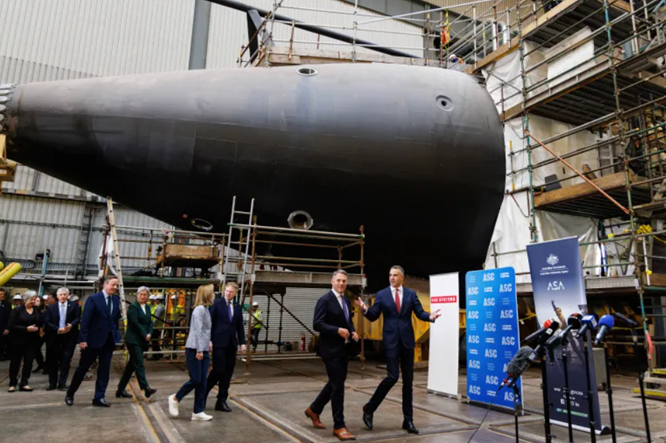In a move to bolster its defense capabilities, Australia has pledged 4.6 billion Australian dollars ($3bn) to support the construction of nuclear-powered submarines in the United Kingdom under the AUKUS deal with the United States. This investment aims to ensure the timely delivery of Australia’s new naval fleet.
Senior officials from the UK and Australia, along with the US ambassador to Australia, visited the naval shipyard in Adelaide, South Australia, where the submarines will be built. Australian Defence Minister Richard Marles expressed confidence in the project, stating, “The three governments involved here are working at pace to make this happen. This is going to happen, and we need it to happen.”
The UK Defence Minister Grant Shapps emphasized the necessity of the submarine program in today’s world, calling attention to the increasingly dangerous global landscape, including China’s assertive behavior and escalating tensions in regions like the Middle East and Europe.
This announcement follows the recent signing of a defense pact between Australia and the UK, aimed at addressing security challenges, particularly China’s activities in the South China Sea and the Pacific.
Under the 10-year plan, the UK’s Rolls-Royce factory in Derby will see increased capacity for building nuclear reactors for the submarines, while BAE Systems in Adelaide will construct the vessels. The submarines, primarily based on a British design, will also incorporate a US weapons system. Australia aims to have eight nuclear-powered submarines operational by the 2050s, a combination of AUKUS-class subs built domestically and in the UK, along with Virginia-class vessels purchased from the US.
Marles highlighted the long-term nature of the project, stating that AUKUS-class submarines will continue to be produced in Australia “every few years” indefinitely. He emphasized that once a country develops the capability to build nuclear-powered submarines, it typically maintains and expands that capability.
The new submarines will offer significant advantages over Australia’s existing diesel fleet, including quieter operation and the ability to deploy over long distances without surfacing, enhancing Australia’s maritime security and deterrence capabilities.
However, China has raised concerns about the AUKUS deal, warning that it could lead to an arms race in the Asia Pacific. Beijing has been actively modernizing and expanding its military, particularly its navy, and has been increasingly assertive in its territorial claims, including in the South China Sea and regarding Taiwan.
Recent reports of Chinese military aircraft activity around Taiwan underscore the region’s heightened tensions, with Beijing asserting its claim over the self-ruled democratic island.
Australia’s investment in nuclear submarines marks a significant step in its defense strategy, aligning with its allies to address regional security challenges and strengthen its maritime capabilities for the future.
(Source: The Guardian | Associated Press | Al Jazeera)









